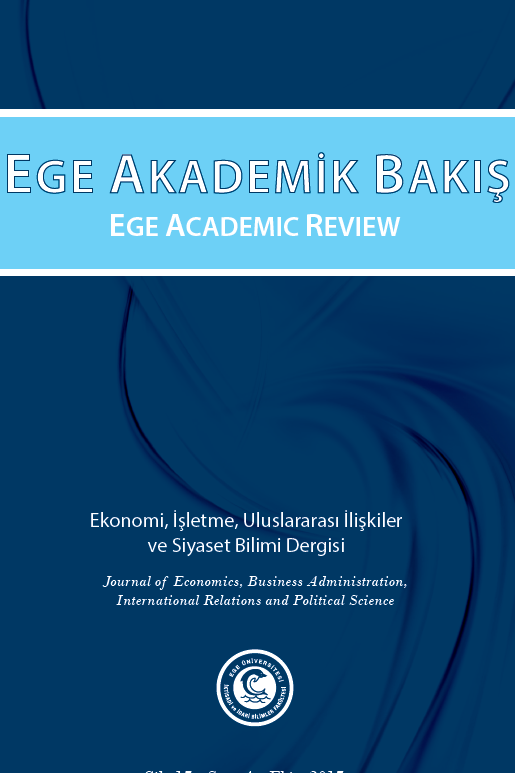BİREYSEL VE İŞ ORTAMINA AİT ETKENLER AÇISINDAN İŞ DOYUMU
Bu çalışmanın temel amacı çalışanlar ve işletmeler açısından son derece önemli olan iş doyumunu, olguyu etkileyen bireysel ve iş ortamına ait etkenler açısından incelemektir. Bu amaçla Erzurum’da çalışan 454 hekim üzerinde gerçekleştirilen araştırma sonuçları yaş, hizmet süresi ve işle ilgili düşünce gibi bireysel faktörlerle, statü, örgütsel ortam ve koşullar gibi iş ve iş ortamına bağlı nedenlerin iş doyumunu büyük oranda etkilediğini ortaya koymaktadır
The main aim of this study is to analyze the concept of job satisfaction in terms of individual and organizational factors. The results of the application which was carried on 454 doctors working in Erzurum showed that individual factors such as age, length of service and thoughts about the job, and organizational or work-setting related factors such as status, organizational environment and conditions effect the job satisfaction of doctors to a large extent
___
- SLAN S.H., ASLAN R.O., KESEPARA C., ALPARSLAN N., ÜNAL M. (1997): “Kocaeli’nde Bir Grup Sağlık Çalışanında İşe Bağlı Gerginlik Tükenme ve İş Doyumu”, Toplum ve Hekim 1997; 82 (12), 24–29.
- BAYSAL A.C. (1981): Sosyal ve Örgütsel Psikolojide Tutumlar, Yalçın Ofset Matbaası, İstanbul
- BİNGÖL, D. (1990): Personel Yönetimi ve Beşeri İlişkiler, Atatürk Üniversitesi Basımevi, Erzurum.
- BİRİNCİ N. (1999): Bursa’da Görev Yapan Hekimlerde İş Doyumu ve Bunu Etkileyen Etmenler. Uludağ Üniversitesi Sağlık Bilimleri Enstitüsü, Yayınlanmış Doktora Tezi, Bursa.
- COHEN L., HOLIDAY M. (1983): Statistics for Social Scientists, London.
- DAVIS K.(1988): İşletmelerde İnsan Davranışı Örgütsel Davranış. Çeviri. Kemal Tosun. İ.Ü. İşletme Fakültesi, İstanbul.
- DİCLE Ü., DİCLE A. (1989): “Motivasyon”, Eskişehir İktisadi ve Ticari İlimler Akademisi Dergisi , 7.
- ERDOĞAN İ. (1983): İşletmelerde Kişi Değerlemede Psikoteknik. İstanbul Üniversitesi, İstanbul.
- ERDOĞAN, İ (1996): İşletme Yönetiminde Örgütsel Davranış, Avcıoğlu Basım Yayım, İstanbul.
- EREN E.(1989): Yönetim Psikolojisi, Yön Ajans, İstanbul.
- ERKMEN T., ŞENCAN H.(1994): Örgüt Kültürünün İş Doyumu Üzerindeki Etkisinin Otomotiv Sanayide Faaliyet Gösteren Farklı Büyüklükteki İki İşletmede Araştırılması, Dokuz Eylül Üniversitesi İşletme Fakültesi Yayınları, İzmir.
- 63
- FIELDS D.L., BLUM T.C. (1997): “Employee Satisfaction in Work Groups with Different Gender Composition”, Journal of Organizational Behavior,
- GREENBERG, J.; BARON, R.A. (2000): Behavior in Organizations, Seventh Edition, Prentice Hall, New Jersey.
- HAYRAN O., AKSAYAN S.(1991): “Pratisyen Hekimlerde İş Doyumu”, Toplum ve Hekim 47, 16-17.
- HICKSON, C.; OSHAGBEMİ, T.(1999): “The Effect of Age on the Satisfaction of Academics with Teaching and Research”, International Journal of Social Economics, 26 (4), 537-544.
- HIGGINS, M.C. (2000): “The More, The Merrier? Multiple Developmental Relationships and Work Satisfaction”, Journal of Management Development, 19 (4), 277–296.
- IRIS B.; BARRET S.V.(1972): “Some Relations Between Job and Life Satisfaction and Job Importance”, Journal of Applied Psychology, 56, 301–304.
- KAVANAGH M.J., HALPERN M.(1977), “The Impact of Job Level and Sex Differences on The Relationship Between Life and Job Satisfaction”. Academy of Management Journal, 20, 66–73.
- KAYNAK T.(1990): Organizasyonel Davranış ve Yönlendirilmesi., Alfa Basım Yayın Dağıtım, İstanbul.
- KOLASA B.J.(1969): İşletmeler İçin Davranış Bilimlerine Giriş. Çeviri. Kemal Tosun. İ.Ü. İşletme Fakültesi, İstanbul.
- LAM, S. (1995): “Quality Management and Job Satisfaction”, International Journal of Quality & Reliability Management, 12 (4), 72–78.
- LUTHANS, F. (1995): Organizational Behavior, McGraw-Hill, Inc.
- MUSAL B.(1992): Pratisyen Hekimlerde Mesleki Doyum ve Etkileyen Faktörlerin Belirlenmesi. Dokuz Eylül Üniversitesi Halk Sağlığı, Doktora Tezi. İzmir.
- MUSAL, B.(1995): “Uzman Hekimlerde Mesleki Doyum”, Toplum ve Hekim, 68 (10), 2–7
- ORAN (BAŞKAYA), N.(1989): Job Satisfaction of a Group of Academical Staff in Marmara University. Marmara Üniversitesi Sosyal Bilimler Enstitüsü, Yüksek Lisans Tezi. İstanbul.
- ORPEN C. (1978): “Work and Nonwork Satisfaction: Causal Correlational Analysis”, Journal of Applied Psycology, 63, 530-532.
- OSHAGBEMI, T. (1999): “Academics and Their Managers: A Comparative Study in Job Satisfaction”, Personel Review, 28 (1-2), 108-123.
- OSHAGBEMI, T. (2000): “Satisfaction with CoWorkers’ Behaviour”, Employee Relations, 22 (1), 88-106.
- OSHAGBEMI, T. (2000): “Is Length of Service Related to the Level of Job Satisfaction?”, International Journal of Social Economics, 27 (3), 213–226.
- ÖZGEN, H.; ÖZTÜRK, A.; YALÇIN, A. (2002): İnsan Kaynakları Yönetimi, Nobel Kitabevi, Adana.
- SAAL F.A., KNIGHT P.A.(1988): Industrial and Organisational Psychology. Science and Practica Brooks/Cole Publisher.
- SAUNDERS, M., LEWIS, P., THORNHILL, A. (2003), Research Methods for Business Students, Third edition, Prentice Hall, Harlow.
- SCHODERBEK P.P., COSIER R.A., APLIN J.C. (1991): Management, Harcourt Brace Jovanovich Publishers, USA.
- ŞENATALAR F. (1978):Personel Yönetimi ve Beşeri İlişkiler. İ. Ü. Kitabevi, İstanbul.
- YOUSEF, D.A.(1998): “Satisfaction with Job Security As a Predictor of Organizational Commitment and Job Performance in a Multicultural Environment”, International Journal of Manpower, 19 (2), 184–194.
- ISSN: 1303-099X
- Yayın Aralığı: Yılda 4 Sayı
- Başlangıç: 2000
- Yayıncı: Ege Üniversitesi
Sayıdaki Diğer Makaleler
ÜÇ BÜYÜKLERİN -BJK, FB VE GSFİNANS PİYASALARINDAKİ DURUM DEĞERLENDİRMESİ
Ayşen KORUKOĞLU, Serdar KORUKOĞLU
AB’DE ŞEKER POLİTİKASINDAKİ DEĞİŞİKLİKLER, BİOETHANOL ÜRETİMİNİN ÖNEMİ VE TÜRKİYE
Elias ATHANASSIADIS, Yota XANTHACOU, Rezan TATLIDIL
OTEL İŞLETMELERİNDE DIŞ KAYNAKLARDAN YARARLANMA (OUTSOURCING)
JAPONYA’NIN YABANCI PAZARLARA GİRİŞ STRATEJİLERİ
BİREYSEL VE İŞ ORTAMINA AİT ETKENLER AÇISINDAN İŞ DOYUMU
Figen SEVİMLİ, Ömer Faruk İŞCAN
TÜKETİM KÜLTÜRÜNDE BEDEN GÜZELLİĞİ VE YEMEK YEME ARZULARI: KADINLARIN TÜKETİM PRATİKLERİNE YANSIMASI
